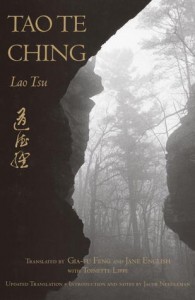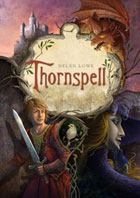Which Speaks, Book Or Author?
On January 20th (2014), I posted on “The Tao Of Writing: ‘The Book That Can be Spoken Of Is Not The Book’.”
The post was an update on writing progress for Daughter Of Blood, The Wall Of Night Book Three, but in it I wrote, amongst other things, that:
 “…the quote in the title…derives from Lao Tzu’s Tao Te Ching. I have paraphrased the opening line, which (in my edition) reads:
“…the quote in the title…derives from Lao Tzu’s Tao Te Ching. I have paraphrased the opening line, which (in my edition) reads:
“The Way that can be spoken of is not the Way.”
One interpretation of this is that the Tao or Way that can be spoken of or described is not the true Tao, which by implication can only be directly experienced.
The reason I’ve titled this post “The Tao Of Writing: ‘The Book That Can Be Spoken Of Is Not the Book’…” is because I feel that the spirit of the Tao Te Ching quote is directly applicable to writing—that until the book is done and can be directly experienced by readers, then there is little of merit to talk about…”
The part that I have continued to mull over in the intervening period is:
“…until the book is done and can be directly experienced by readers…”
I have also posted recently on the relationship between online interaction and writing books (in my case, novels.) In that case, I felt that “immersion in the one (social media) may actively work against one’s ability to deliver in the other (book-length stories.)“
I also observed that the “conundrum for the modern author though, is how that will work out in a contemporary world where the received wisdom is that it is vital, in order to succeed, for the writer to be active on social media.”
Lots of “terribly important” (or far more likely, unimportant! ;-)) thoughts indeed! Now, here’s one more.
Part of the drive for authors to be on social media is so she/he may either directly or indirectly tout her/his wares by talking about the book de jour, the writing process and the writing life. I know many readers are genuinely interested in these sort of conversations, too, as are other writers. Increasingly though, the question that has been dogging me is whether an author “should” speak about the book, or rather leave the book to speak for itself, through the direct, interactive experience we call reading.
Sure, as the author I can post or talk about my intentions and aspirations when I began telling the story. But the thing about a book-length work is that it’s multi-layered and complex. Books also evolve and grow through the telling, and the stories they relate are dynamic and contextual. So no matter my intention or aspiration as author when I begin my storytelling, it may well be that other threads and themes work their way in as I write. Some of them may even be so subtle or well camouflaged that I may not consciously detect them, whereas a reader may…
 So the moment I say I have written a book and it’s about this or about that, other than at the most broadbrush level (e.g. that “Thornspell is a fairytale retelling of Sleeping Beauty from the perspective of the prince”), then I am already potentially closing off options for those readers who set store by the author’s view.
So the moment I say I have written a book and it’s about this or about that, other than at the most broadbrush level (e.g. that “Thornspell is a fairytale retelling of Sleeping Beauty from the perspective of the prince”), then I am already potentially closing off options for those readers who set store by the author’s view.
And what if a reader reads the book and finds something in it that is deep and rich and satisfying for them, but does not accord with what the author has said that the book is about? Does that make the reader wrong about her/his reading experience? Or the author wrong about her/his book? Is it possible, in fact, that both can be entirely right — because ultimately it is the book that speaks and books are indeed nuanced (multi-layered, complex, dynamic and contextual.)
The more I reflect, the more I am personally convinced that it is the book and only the book that should speak, and the author should be, if not invisible, at least largely inaudible on the subject of “the book.” In that sense I come back to the wonderful AS Byatt words that I have quoted here before:
 “Think of this – that the writer wrote alone, and the reader read alone, and they were alone with each other.”
“Think of this – that the writer wrote alone, and the reader read alone, and they were alone with each other.”
This conversation, however, only occurs through the median of the book…
When it comes to the author speaking, I feel there’s a little more scope for output on writing process and the writing life (both of which are areas this post may be said to touch on), topics that I may return to later.
For today though, I’m interested in putting the thesis out there as to whether it is the book that should speak, or the author — and definitely in hearing your thoughts as readers and/or writers yourselves, should you wish to share them.








Hi Helen,
I think both the author and the novel have different things to say. I love losing myself in the people and places created in a novel, and mostly just wrap myself up in the story until the novel is finished with little thought spared for the person who actually created this world. I don’t think the author giving an interview or writing a blog post explaining what the novel was about would necessarily change my mind about how I interpreted it. However, once I’ve finished reading, I love finding out about the person who wrote the novel, to see what influenced them, and what they are interested in, which is why I read blogs like yours 🙂 (really looking forwards to book 3 by the way!)
Thank you for these observations, Shona. I suspect it’s a fine line been talking about aspiration and intention, and leaving scope for readers to form their own opinions. Mainly I just don’t want anything to interfere with the signal the books are emitting, but agree that influences and interests probably fall within the scope of writing process and wriitng life, where I do feel more comofrtable talking.
As for WALL3, you’ll be pleased to know that the overarching editorial feedback has been very positive, which means that all is on track to get the book out there to readers. 🙂
This is going to sound horribly mean-spirited, but I don’t mean it to be so. It was extremely irritating to me to notice how many blog posts and interactions w/ social media you had when there was such a long wait between books. I found myself wishing you’d spend more time on the book.
This is not to say that you owe me, or any reader, a book within some subscribed time period. As a reader, it is very hard to see so much production elsewhere while anxiously awaiting the next installment.
I don’t think it’s mean-spirited at all, Jesslyn — possibly because I felt exactly the same but was caught up in the “loop” that this is what one has to do as a contemporary author in an increasingly social-media world. Of course, like everything, the book and/or social media dilemma is really only the tip of an iceberg, so in fact I was spending far more time on the book than might have appeared only not social mediarizing about it becasue of whole “the book that can be spoken of is not the book” thing. But what the social mediarizing meant, effectively, was that I never had any “down time”, because that got subsumed by the social media obligations — and as I’ve posted recently, the two modes are not complementary for me. So effectively, even if the social mediarization was not cutting into actual writing time, it was still acting as a drag on the creative process. Anyway, I was thinking of posting more about this anyway, so will take your comment as a spark to do that and leave further exploration of the iceberg for that.:)